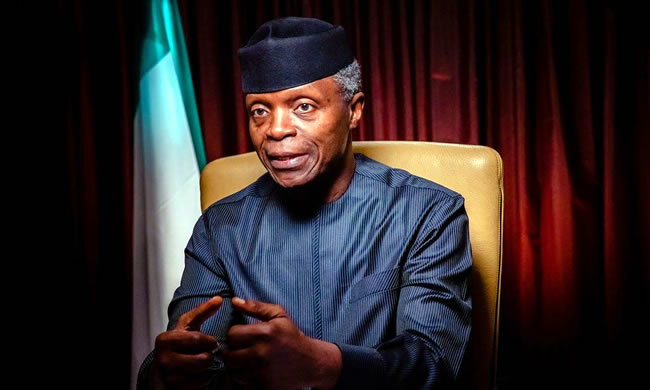Vice President Yemi Osinbajo says it has become imperative for Africa to define its plan and come up with a vision that addresses the continent’s peculiarities on energy transition. Osinbajo’s spokesman, Laolu Akande, in a statement on Thursday in Abuja, said that the vice president spoke at the Infrastructure Solutions Summit organized by the Africa Finance Corporation (AFC).
The summit featured a set of two fireside chats with the vice president and the President of Ghana Nana Addo Akufo-Addo, anchored by BBC’s Nancy Kacungira.
“We are in a peculiar position; this is why Africa needs to come in very forcefully to chart a different path. We are not just challenged in terms of global warming, but for us, it is also the existential challenge of just survival. There are several voices around the world and in Africa who are saying the same thing; I think that there is some change.”
“The EU has categorized nuclear and gas as green investments, and they are saying they are going to need more investments in gas over the next 10 years so as to be able to meet their targets of 2050. They are leaving us room to say that we, in Africa, are going to be needing investments in gas in the next 30 years for us to be able to meet our targets.”
According to him, Africa first needs to come together to put out its vision for climate change or carbon neutrality by 2050, 2070, or whenever it is convenient.
He said he believed there were ongoing efforts towards that.
“We think that at Egypt COP27 forthcoming climate change conference in Egypt, we will begin to articulate an African vision and initiative because all of the decisions were initiated and taken by wealthier countries where they defined practically everything about how we respond to climate change.”
“But our own peculiarities and challenges are different. We need to have access to energy, access to electricity just to be able to survive and create an industry for the millions of people. So, Africa has an existential challenge and survival around our economies.”
On infrastructure development, the vice president said the Federal Government was committed to the infrastructure development of the country.
According to him, there is a Presidential Infrastructure Development Fund in the order of a billion dollars for a start.
”We started with the seed fund of about a trillion naira. I think we have key opportunities, and it may be impossible now; we might need to do more; for me, I think what we need to do will be more innovation.”
“There’s a huge gap there, but I think innovation is what will play a significant part. For example, seeing the models that already exist, there is plenty of room for more improvements; such as insurance that has not yet been leveraged or used,” he said.
Other speakers at the opening session of the summit were the Deputy Governor of the Central Bank of Nigeria (CBN), Kingsley Obiora, President of AFC, Samaila Zubairu, President of the AFREXIM Bank Prof Benedict Orama among others.

















Discussion about this post